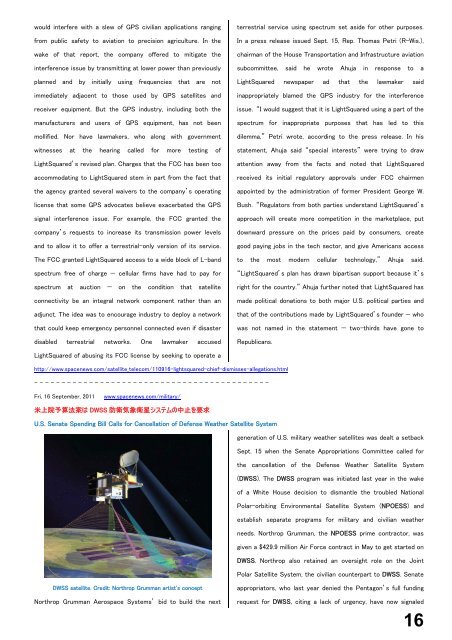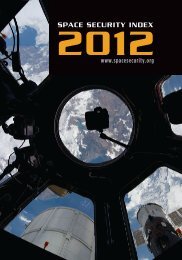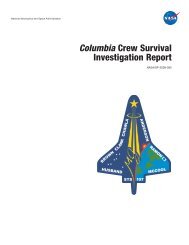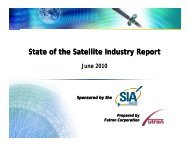24 - Space-Library
24 - Space-Library
24 - Space-Library
Create successful ePaper yourself
Turn your PDF publications into a flip-book with our unique Google optimized e-Paper software.
would interfere with a slew of GPS civilian applications ranging<br />
from public safety to aviation to precision agriculture. In the<br />
wake of that report, the company offered to mitigate the<br />
interference issue by transmitting at lower power than previously<br />
planned and by initially using frequencies that are not<br />
immediately adjacent to those used by GPS satellites and<br />
receiver equipment. But the GPS industry, including both the<br />
manufacturers and users of GPS equipment, has not been<br />
mollified. Nor have lawmakers, who along with government<br />
witnesses at the hearing called for more testing of<br />
LightSquared’s revised plan. Charges that the FCC has been too<br />
accommodating to LightSquared stem in part from the fact that<br />
the agency granted several waivers to the company’s operating<br />
license that some GPS advocates believe exacerbated the GPS<br />
signal interference issue. For example, the FCC granted the<br />
company’s requests to increase its transmission power levels<br />
and to allow it to offer a terrestrial-only version of its service.<br />
The FCC granted LightSquared access to a wide block of L-band<br />
spectrum free of charge — cellular firms have had to pay for<br />
spectrum at auction — on the condition that satellite<br />
connectivity be an integral network component rather than an<br />
adjunct. The idea was to encourage industry to deploy a network<br />
that could keep emergency personnel connected even if disaster<br />
disabled terrestrial networks. One lawmaker accused<br />
terrestrial service using spectrum set aside for other purposes.<br />
In a press release issued Sept. 15, Rep. Thomas Petri (R-Wis.),<br />
chairman of the House Transportation and Infrastructure aviation<br />
subcommittee, said he wrote Ahuja in response to a<br />
LightSquared newspaper ad that the lawmaker said<br />
inappropriately blamed the GPS industry for the interference<br />
issue. “I would suggest that it is LightSquared using a part of the<br />
spectrum for inappropriate purposes that has led to this<br />
dilemma,” Petri wrote, according to the press release. In his<br />
statement, Ahuja said “special interests” were trying to draw<br />
attention away from the facts and noted that LightSquared<br />
received its initial regulatory approvals under FCC chairmen<br />
appointed by the administration of former President George W.<br />
Bush. “Regulators from both parties understand LightSquared’s<br />
approach will create more competition in the marketplace, put<br />
downward pressure on the prices paid by consumers, create<br />
good paying jobs in the tech sector, and give Americans access<br />
to the most modern cellular technology,” Ahuja said.<br />
“LightSquared’s plan has drawn bipartisan support because it’s<br />
right for the country.” Ahuja further noted that LightSquared has<br />
made political donations to both major U.S. political parties and<br />
that of the contributions made by LightSquared’s founder — who<br />
was not named in the statement — two-thirds have gone to<br />
Republicans.<br />
LightSquared of abusing its FCC license by seeking to operate a<br />
http://www.spacenews.com/satellite_telecom/110916-lightsquared-chief-dismisses-allegations.html<br />
- - - - - - - - - - - - - - - - - - - - - - - - - - - - - - - - - - - - - - - - - - -<br />
Fri, 16 September, 2011<br />
www.spacenews.com/military/<br />
米 上 院 予 算 法 案 は DWSS 防 衛 気 象 衛 星 システムの 中 止 を 要 求<br />
U.S. Senate Spending Bill Calls for Cancellation of Defense Weather Satellite System<br />
generation of U.S. military weather satellites was dealt a setback<br />
Sept. 15 when the Senate Appropriations Committee called for<br />
the cancellation of the Defense Weather Satellite System<br />
(DWSS). The DWSS program was initiated last year in the wake<br />
of a White House decision to dismantle the troubled National<br />
Polar-orbiting Environmental Satellite System (NPOESS) and<br />
establish separate programs for military and civilian weather<br />
needs. Northrop Grumman, the NPOESS prime contractor, was<br />
given a $429.9 million Air Force contract in May to get started on<br />
DWSS. Northrop also retained an oversight role on the Joint<br />
Polar Satellite System, the civilian counterpart to DWSS. Senate<br />
DWSS satellite. Credit: Northrop Grumman artist's concept<br />
Northrop Grumman Aerospace Systems’ bid to build the next<br />
appropriators, who last year denied the Pentagon’s full funding<br />
request for DWSS, citing a lack of urgency, have now signaled<br />
16
















